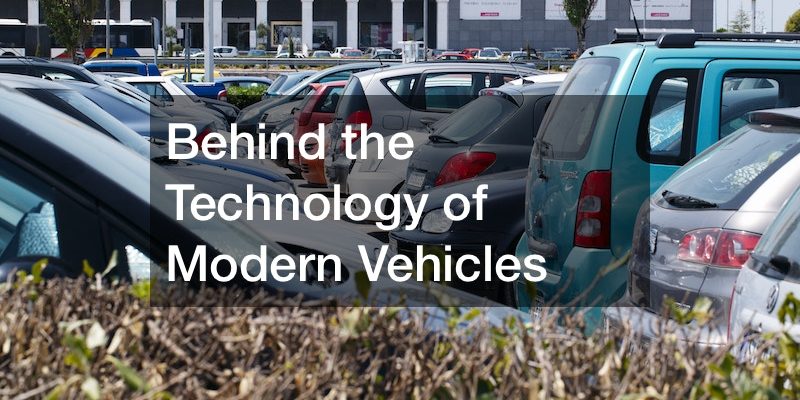
Technological advancements have come to shape modern life. Advances in personal and industrial technology have brought about new products, new ways of working, and a truly modern and connected world. The various types of industrial technology have brought about a new landscape in the industrial world.
Technologies have improved efficiency and safety. In this article, we’re going to explore how technological advancements have come to shape Industries like manufacturing, gas, plumbing, recycling, home modification, and metal fabrication. We’re going to take a look at the kinds of technological equipment employed in these industries, and how they’ve made the industries safer and more efficient.
1. Logistics Technologies
The hauling business is always changing. Fleets are always on the move, and the standards of the industry are evolving all the time. As such, the technology within the industry has had to keep up. There are many types of industrial technology used within the logistics and hauling industry. Technologies like radio communications and GPS tracking play a huge role in the hauling industry. They help logistics companies keep track of their fleets and meet their deadlines and targets.
The future of technology within the logistics industry is a very interesting topic to explore. There are a lot of different types of industrial technology that industry could benefit from. Apps and mobile devices could play a huge role in keeping delivery times down, and they can ensure a higher degree of accuracy in general.
The main technological headache for the hauling industry is trying to find ways to reduce emissions. Businesses are striving to be more environmentally conscious, but hauling freight around the globe comes with its fair share of emissions. Work is already underway to try and reduce these emissions. McDonald’s in the UK, for example, run all of their trucks on recycled cooking oil from their franchise locations.
2. Metal Fabrication Technologies

The process of metal fabrication plays a vital role in so many different industries, the technologies behind metal fabrication represent some of the most important types of industrial technologies out there. Metal fabrication is a cornerstone of industries such as components, machinery, and construction.
There are a number of technological advancements that are moving the metal fabrication industry forward. The thing that’s had the biggest impact in automation and CNC machining. Most of the work in metal fabrication used to involve a lot of human-led work, but recent advancements in automation have streamlined these tasks and made them far more precise.
Reshoring has also had a major influence. Put simply, reshoring is the opposite of outsourcing. It is the act of metal fabrication companies returning to the country they are from. This has been possible in part thanks to technological advancements within those countries. For example, a prospective welder may find more welder training opportunities in a country that companies are returning to after previously outsourcing a lot of their work.
3. Advancements in Roofing Technologies

You might think that your local roofer is working with old technology and equipment that they’ve had for years, but this would be a naive opinion to hold. There have been a number of recent advancements in the roofing industry that have made the entire industry more modern and more environmentally friendly. It is perhaps the most surprising of the types of industrial technology advancements on this list.
First of all, new manufacturing techniques and technologies have allowed for roofing materials to be made from more eco-friendly materials. This includes the advancement in solar panel technology. Many roofers are now qualified to install solar panels and they find themselves doing it more and more as part of their daily routine.
There have also been improvements in the range of industrial roofing options available. Metal roofing still remains a popular choice for good reason, but commercial property owners in warmer regions are starting to see the benefits of using roofing materials that are specifically designed to keep the heat at bay.
4. Energy Systems for Construction Sites

The construction industry has come a very long way in the last 50 years. There are so many different types of industrial technology that have made improvements to the construction business over the years, but the unsung heroes are the propane systems that keep building sites lit, warm, and working.
Propane is the thing that keeps most construction sites running. One of the primary things that it’s used for is to provide heat. Construction work doesn’t only occur in the summer, and working outside in the winter months can be grueling if you don’t have any source of heat to keep you warm on the job. Propane heaters dotted around the construction site help to keep the workers warm and able to do their jobs properly. Some construction sites might run electric radiators, but these would need to be plugged in to a power source being run by a propane generator.
Another great use of propane in the construction industry is to provide power to the site. Construction sites need to be lit, and they need power to make sure that the various power tools in use can function properly. Propane is widely used to fuel big generators that produce electricity for the entire site.
Thirdly, propane can be used on construction sites to run vehicles like trucks and cars. This is especially helpful on bigger construction sites where materials and people need to move around the site quickly. Propane is often used as a more efficient fuel source for these sorts of vehicles. They can perform just as well as vehicles that are running on gasoline.
5. Material Handling Equipment
Material handling is a vital component of many businesses. The ability to be able to handle and maneuver stock is important for warehouses, haulers, and manufacturers. As such, different types of industrial technology are optimized for use in material handling. The biggest and most well-known of these is the industrial truck. Trucks are indispensable for the task of moving stock from one location to another. They are the lifeblood of businesses across the world as truckers work through the night to make sure that goods and products get where they need to be.
Moving into warehouses, things like forklifts and order pickers are crucial. They allow workers in warehouses to be able to reach items that are high up on the shelves or too heavy to be lifted by hand. When companies have these pieces of equipment, they can more ergonomically arrange their stock and make better use of their warehouse space.
A lot of companies make their money by renting out these bits of equipment. Equipment rental is a great option for companies that are used to working in different locations or need things like forklifts on short notice. Think about industries like the events business or the music industry, they are both industries that regularly hire out equipment on a night-by-night basis.
6. Pneumatic Systems
Pneumatic systems play a crucial role in many different industries. One of the most important parts of any good pneumatic system is an air compressor. The basic purpose of a compressor is to turn a gas into power. You can either have a dynamic or positive displacement compressor.
Compressed air is used in more things than you’d realize. If you’ve ever opened a fizzy drink, then you’ve experienced the benefits of an air compressor being used during the manufacturing process. How exactly is air compressed? Air compressors draw in air via an inlet valve. This air is then compressed, and the pressurized air is released into a storage tank through a discharge valve.
Compressed air is a versatile tool for many applications because it’s relatively easy to make and even easier to store. It also makes a great source of energy when compared to other forms of pressurized air like steam, which can be hazardous due to high heat.
7. Plumbing Technologies

Plumbing technologies have done a great deal to help the human race over the years. Advancements in plumbing technologies have saved people from countless illnesses, and they have improved sanitation around the world. The plumbing industry is still moving forward every day.
One of the most popular types of industrial technology advancements in plumbing is touchless fixtures. Smart bathrooms have been around for a while, but they’re only going to get more popular in the years to come. The effects of the COVID pandemic have led people to become far more health conscious and people want to minimize the amount of surfaces that they’re touching within a bathroom.
Another smart feature that is set to become more popular is the smart toilet. These have been around for a long time in Japan, but here in the West they are more viewed as an oddity. Don’t be shocked if you start seeing more and more of them coming in the future. They’re likely to be rolled out as an industrial plumbing solution before they start to make their way into people’s homes.
In other industrial settings, smart irrigation systems could be another advancement that we see. Hydraulic efficiency in rural areas has led to an advance in these kinds of systems, and the early signs are that they could solve a lot of problems for farmers and other businesses that use an irrigation system.
Sustainability in the Metal Industry
Sustainability is a hot-button issue across a lot of different industries. The metalworking industry is one of those that is trying to think of technological innovations that can make the whole industry more eco-friendly. Things like steel recycling are a good start, but the industry also needs to find some solutions that can make the entire manufacturing process more sustainable in general.
Recycling practices are a great place to start, but they are not the be-all and end-all of sustainability technology in the metal industry. One of the biggest technologies that can be brought in comes in the form of sustainable mining practices. Mining practices should cause minimal disruption to the local environment, and waste products should be kept to a minimum throughout the process.
The industry would also benefit by adopting technologies that allow for more energy-efficient production techniques. Current methods can use a great deal of energy, and it is up to engineers in the industry at large to come up with new techniques that can bring this burden down.
Industries are always going to need metal, so it’s up to metal businesses to take the step towards a more sustainable practice. It is a challenging ask but considering the distance that the industry has already come to cleaning up, it is far from being impossible.
Technological Advancements Are More Important Than Ever
For some, the relentless march of technology can be quite intimidating, but you only have to think about how far we’ve come with technology to see all the good it has done us. We’re living in a time when the technological advancements of the future have the potential to shape new trends for a number of industries and our lives in general.
Most of the types of industrial technology advancements in this list are working to make their industries cleaner, greener, and more efficient. As we move into 2024, the trends that we see will be worth keeping an eye on. Not only will they prevent sound investment opportunities for many people, they will also be of interest to anyone working in the industries mentioned above.
Technology should be there to make our jobs easier, so paying attention to the types of industrial technology that are coming through is a good way to make sure that you’re staying ahead of the curve at work. If you can anticipate the technology and be able to use it when it comes in, then you’re going to be on the right track in terms of your overall career progression. Technology is not going to stop advancing, so it’s time to embrace it and reap the benefits of working with it rather than fighting against it.



